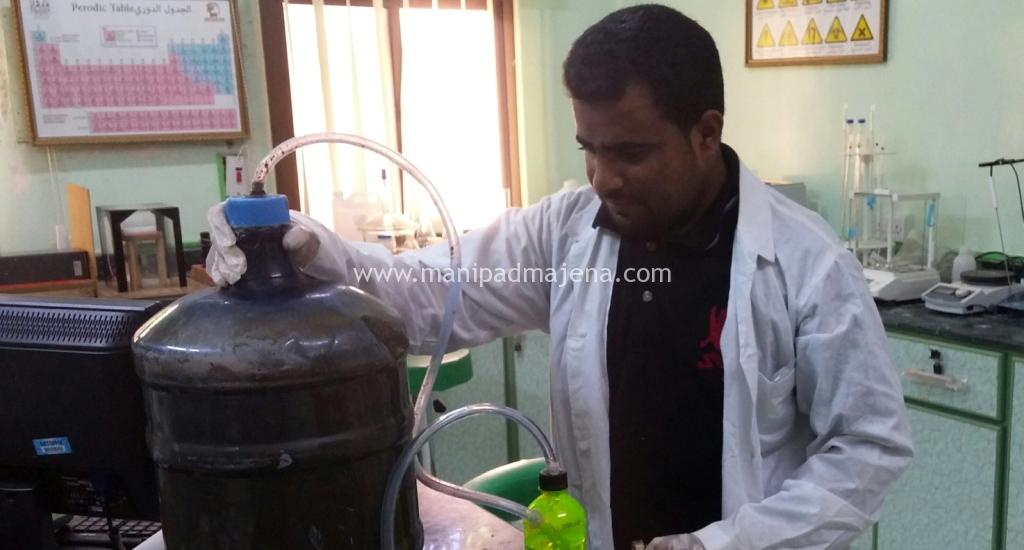
NAIROBI, Jan 17 (Thomson Reuters Foundation) – Growing up in Al-Harrah, a small village in west-central Yemen, Omer Badokhon watched his mother cooking for hours at a time in a smoke-filled kitchen.
Now the chemical engineering graduate hopes a small-scale biogas system he has invented can tackle unhealthy indoor pollution in his war-torn country.
Last February, the 24-year-old was among a group of Hadramout University students designing a landfill in Mukalla City, a port on the Gulf of Aden.
Realising that recovering biogas from the landfill would take several years and serve only one city, Badokhon set himself the challenge of coming up with micro-scale plants for individual urban and rural homes.
The goal was to provide them with clean cooking fuel, lighting and organic fertiliser, while reducing the trash heaped up on city streets that has helped spread cholera.
“In some villages, electricity has not been restored since the conflict began in 2015,” Badokhon told the Thomson Reuters Foundation.
“In Mukalla City where I now live, I remember how desperate I felt trying to complete university assignments by candlelight when power shuts down for four to six hours every day.”
Last month in Nairobi, Badokhon received a “Young Champions of the Earth” award from UN Environment, which will help him put his solution into practice in Yemen.
The biogas devices will be constructed locally using plastic or fibreglass with support from the Hadramout Foundation for Invention in Mukalla.
They will be piloted in 1,500 rural homes in Hadramout, Shabwa, Taiz, Sanaa, Ibb and Aden governorates over the next eight months.
Badokhon will use his $15,000 in prize money to build a first batch of 50 to 80 units, and has also received $10,000 from Yemeni oil company PetroMasila to complete his research.
POLLUTION REDUCTIONS
The awards jury said his project could help tackle three major problems in Yemen. By utilising organic waste that produces methane, a potent greenhouse gas, the biogas system can contribute to curbing global warming.
It also addresses widespread dumping of waste – the major culprit for a cholera epidemic that affected a million Yemenis in 2017.
And it will supply clean fuel for rural homes in a country where more than 3 million people still cook over open fires, causing severe respiratory illness and even death.
After months of experimentation, Badokhon has refined a bio-chemical catalyst that breaks down organic waste faster. Combined with specially designed fermenting chambers, the technology can double the amount of biogas produced from a set quantity of waste feed, he said.
Fifteen prototypes will first be installed in Mukalla homes free of charge, to fine-tune the final product, before it is rolled out more widely.
Biogas is a renewable source of energy, produced when bacteria break down biodegradable material in oxygen-free chambers.
The fermentation produces a gas made up of 55-70 percent methane and 30-45 percent carbon dioxide. Biogas can be used in its pure form for cooking, combusted to generate lighting and heat, and refined into natural gas and transport fuel.
Badokhon said Yemenis each produce half a kilo of organic waste per day, meaning a family has 2 to 4 kg daily feedstock for a biogas unit, which can provide two hours of cooking fuel without a catalyst – “sufficient to make lunch”.
Cattle manure, another key source of methane, can be added to household waste such as vegetable peelings, further reducing emissions, while the organic liquid fertiliser that is a by-product of the biogas process saves on chemical fertiliser costs, he added.
SHORT OF POWER, CASH
Badokhon noted that Yemen currently produces only 750 megawatts of electricity from a potential capacity of about 1,300 megawatts, most of it generated from fossil fuels.
“You can imagine our plight,” he said, adding that he has included provisions for solar panels as part of his household unit, to power lights and cooling fans.
In the past five years, half of Yemen’s rural households and three-quarters in cities are estimated to have installed solar power systems, according to the World Bank.
Yet while the conflict rages on, Badokhon is concerned that the $250-$300 cost of a home biogas plant may be too high for most families.
“It’s not easy for Yemenis in these dire times to pay this amount – people can’t afford even food,” he said.
He is crafting a proposal for the United Nations and others to fund the production of his units, so they could be provided free to rural families.
Launched in 2017 by UN Environment and polymer manufacturing company Covestro, the “Young Champions of the Earth” award also offers entrepreneurship training and mentoring to help its six regional winners kick-start their innovations.
Reporting by Manipadma Jena; editing by Megan Rowling. Please credit the Thomson Reuters Foundation, the charitable arm of Thomson Reuters, that covers humanitarian news, climate change, resilience, women’s rights, trafficking and property rights. Visit http://news.trust.org/climate
*Travel for this story was supported by UN Environment.
Featured Image: Omer Badokhon, winner of the 2017 “Young Champion of the Earth” award for West Asia, works in his laboratory in Mukalla City in Yemen, on November 2, 2017. Courtesy/Omer Badokhon
Read Original article at:https://www.zilient.org/article/inventor-aims-healthier-yemen-turning-waste-clean-fuel
